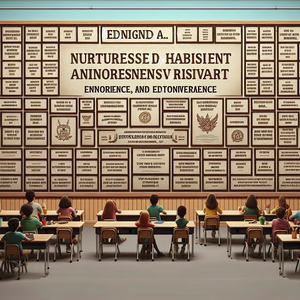The Art of Teaching Soft Skills: Preparing Students for Success Beyond the Classroom

Soft skills, often referred to as "interpersonal" or "life" skills, have become indispensable in today’s evolving job market. While technical expertise (hard skills) remains critical, it is no longer sufficient on its own. A 2023 report by the World Economic Forum highlighted key skills such as emotional intelligence, creativity, problem-solving, and collaboration as essential for success in the modern workforce. As industries increasingly adopt automation and artificial intelligence, soft skills have become a defining characteristic of what makes humans uniquely valuable. For students, developing these skills is not just about securing a job. Soft skills prepare them for diverse aspects of life, from navigating higher education and excelling in interviews to building strong relationships and managing stress in personal and professional settings. Yet, these essential skills are often overlooked in traditional curricula, leaving a gap that educators must address. The challenge lies in how to effectively teach and assess these intangible traits in a way that resonates with students.
The Challenges of Teaching Soft Skills
Teaching soft skills is no easy task. Unlike hard skills, which are measurable and task-specific (e.g., coding, solving math equations), soft skills are more abstract and subjective. They are deeply influenced by personality, cultural norms, and life experiences, making them harder to quantify and teach in a standardized way. Educators who aim to integrate soft skills into their teaching must confront several challenges: 1. **Abstract and Intangible Nature:** Skills like empathy, adaptability, or effective communication are difficult to define, let alone measure. For educators accustomed to grading essays or solving equations, assessing soft skills requires a different approach. 2. **Cultural and Individual Diversity:** Students come from varied cultural and personal backgrounds, which influence how they approach collaboration, leadership, or emotional intelligence. These differences can make it challenging to create universal learning models. 3. **Lack of Awareness Among Students:** Many students, particularly younger ones, may not immediately grasp the importance of soft skills. They may prioritize academic achievements or technical abilities, undervaluing the interpersonal traits that will later prove critical in their lives. 4. **Curriculum Constraints:** Traditional education systems often prioritize academic subjects over life skills, leaving little room for soft skills instruction. Teachers must find creative ways to integrate these lessons into already packed schedules. Despite these hurdles, teaching soft skills is not an insurmountable challenge. With the right strategies and mindset, educators can ensure that students develop the well-rounded competencies they need to thrive.
Strategies for Effectively Teaching Soft Skills
Teaching soft skills requires a different approach than traditional academic instruction. It emphasizes experiential learning, reflection, and real-world application. Here are several strategies that educators can adopt to teach soft skills effectively: 1. **Experiential Learning:** Hands-on activities and real-world scenarios are among the most effective ways to teach soft skills. Group projects, role-playing exercises, and simulations allow students to practice teamwork, leadership, and problem-solving in a dynamic and interactive environment. For instance, a mock debate or business negotiation can teach students the art of persuasion, active listening, and conflict resolution. 2. **Feedback and Reflection:** Soft skills development relies heavily on self-awareness, which can be cultivated through regular feedback and reflection. After collaborative projects, educators can facilitate peer reviews and self-assessments, encouraging students to evaluate their communication, teamwork, and adaptability. Constructive feedback helps students identify their strengths and areas for growth. 3. **Technology Integration:** Emerging technologies like virtual reality (VR) and artificial intelligence (AI) are opening new avenues for teaching soft skills. VR simulations can immerse students in real-life scenarios—such as resolving workplace conflicts or delivering a presentation to a virtual audience—while AI-powered tools can provide instant feedback on communication and decision-making skills. 4. **Embedding Soft Skills in Core Subjects:** Rather than teaching soft skills as standalone topics, educators can integrate them into traditional subjects. For example, a science project can focus on collaborative problem-solving, while a literature class can emphasize empathy and critical thinking through character analysis. Embedding soft skills in existing curricula demonstrates their relevance across disciplines. 5. **Modeling Behavior:** Teachers serve as role models for their students. By demonstrating effective communication, empathy, and adaptability in their daily interactions, educators can foster a classroom culture that values and encourages soft skills development.
Success Stories: The Power of Soft Skills Education
The transformative potential of teaching soft skills is evident in numerous success stories from around the world. One notable example is Finland, where high schools have introduced "Life Skills" programs that include modules on teamwork, emotional intelligence, and stress management. Students who participated in these programs reported higher levels of self-confidence and performed better in professional settings. In the corporate world, Google’s "Project Oxygen" study offers a powerful testament to the importance of soft skills. The study analyzed the traits of Google's most effective employees and found that technical expertise ranked lower than expected. Instead, qualities like communication, collaboration, and empathy emerged as key drivers of success. This finding underscores the value of soft skills, even in highly technical fields.
Opportunities for Educators: A New Role in a Changing World
The growing emphasis on soft skills has created exciting opportunities for educators at both the secondary and tertiary levels. Schools and universities are increasingly seeking teachers and instructors who can integrate soft skills into their curricula, design innovative learning experiences, and prepare students for the demands of the modern world. This shift highlights the evolving role of educators as not just providers of knowledge but also mentors and facilitators of personal and professional growth. Programs that focus on life skills, professional development, and emotional intelligence are becoming a staple in educational institutions worldwide. This trend aligns with the broader recognition that education must extend beyond academics to address the holistic development of students.
As the world continues to evolve, the ability to adapt, connect, and collaborate has become just as important as technical knowledge. Teaching soft skills is not merely an addition to traditional education—it is a vital component of preparing students for success in an unpredictable future. While challenges remain in teaching and assessing these intangible traits, innovative strategies and a commitment to fostering well-rounded individuals can bridge the gap. The art of teaching soft skills goes beyond preparing students for the workforce; it equips them with the tools to lead fulfilling, meaningful lives. For educators, this represents a profound opportunity to leave a lasting impact—not just on students’ careers, but on their personal growth and capacity to contribute positively to the world. As education continues to adapt to the demands of the 21st century, the focus on soft skills will undoubtedly remain a cornerstone of its evolution.
Soft Skills Curriculum Designer
Google for Education, EdTech companies, and progressive schools like Finland’s education system
Core Responsibilities
Develop and implement curricula focused on teaching soft skills such as communication, teamwork, and emotional intelligence.
Collaborate with educators to integrate soft skills training into traditional academic subjects.
Utilize innovative teaching methods, including experiential learning and technology integration, to engage students.
Assess the effectiveness of the curriculum through feedback, surveys, and real-life applications.
Key Skills and Requirements
Expertise in education design or instructional development, with a focus on life skills.
Experience in using emerging tools like virtual reality or AI for educational purposes.
Familiarity with diverse learning styles and cultural sensitivities.
Corporate Soft Skills Trainer
Fortune 500 companies like Deloitte, PwC, and Accenture, as well as specialized training providers
Core Responsibilities
Conduct training workshops for employees on interpersonal skills, conflict resolution, and emotional intelligence.
Design customized training programs tailored to specific industries or organizational needs.
Use role-playing, simulations, and real-world problem-solving activities to foster learning.
Provide ongoing coaching and development feedback for employees at all levels.
Key Skills and Requirements
Strong background in corporate training, HR development, or psychology.
Ability to measure training outcomes and ROI through performance metrics.
Expertise in addressing team dynamics and leadership development.
Education Technology Specialist (Focus on Soft Skills Tools)
EdTech startups, universities, and innovation-focused school districts
Core Responsibilities
Research and implement digital tools, such as virtual reality platforms, to teach soft skills in educational settings.
Train teachers and administrators on integrating technology into their classrooms to foster collaboration, adaptability, and problem-solving.
Lead pilot programs to evaluate the effectiveness of tech-based soft skills learning initiatives.
Stay updated on emerging technologies like gamified learning platforms and AI-driven feedback systems.
Key Skills and Requirements
Proficiency in EdTech tools and platforms (e.g., Google Classroom, VR training software).
Experience working with K-12 or higher education institutions on technology adoption.
Strong project management skills and ability to interface with multiple stakeholders.
Leadership Development Consultant (Focus on Emotional Intelligence)
Leadership development firms, global corporations like IBM and Microsoft, and consulting firms like McKinsey & Company
Core Responsibilities
Design and deliver leadership development programs with a focus on emotional intelligence, adaptability, and decision-making.
Assess the current leadership skills within an organization and identify areas for improvement.
Facilitate workshops and one-on-one coaching for emerging and senior leaders.
Provide actionable insights and strategies to enhance team collaboration and morale.
Key Skills and Requirements
Advanced knowledge of emotional intelligence frameworks and leadership theories.
Strong facilitation and coaching skills, with certifications like EQ-i 2.0 or ICF preferred.
Proven track record of working with mid-level and senior-level managers in corporate or nonprofit settings.
School Life Skills Program Coordinator
Progressive schools, international schools, and educational nonprofits like Teach For All and UNICEF
Core Responsibilities
Oversee the design and implementation of school-wide life skills programs, focusing on areas like stress management, teamwork, and self-awareness.
Collaborate with educators and counselors to ensure programs address students' diverse needs.
Organize workshops, guest speakers, and extracurricular activities that promote practical application of soft skills.
Monitor and report on student progress and program outcomes to school administration.
Key Skills and Requirements
Background in education, counseling, or social work with a focus on student development.
Strong organizational and communication skills to manage school-wide initiatives.
Creativity in designing engaging and impactful programs for various age groups.


